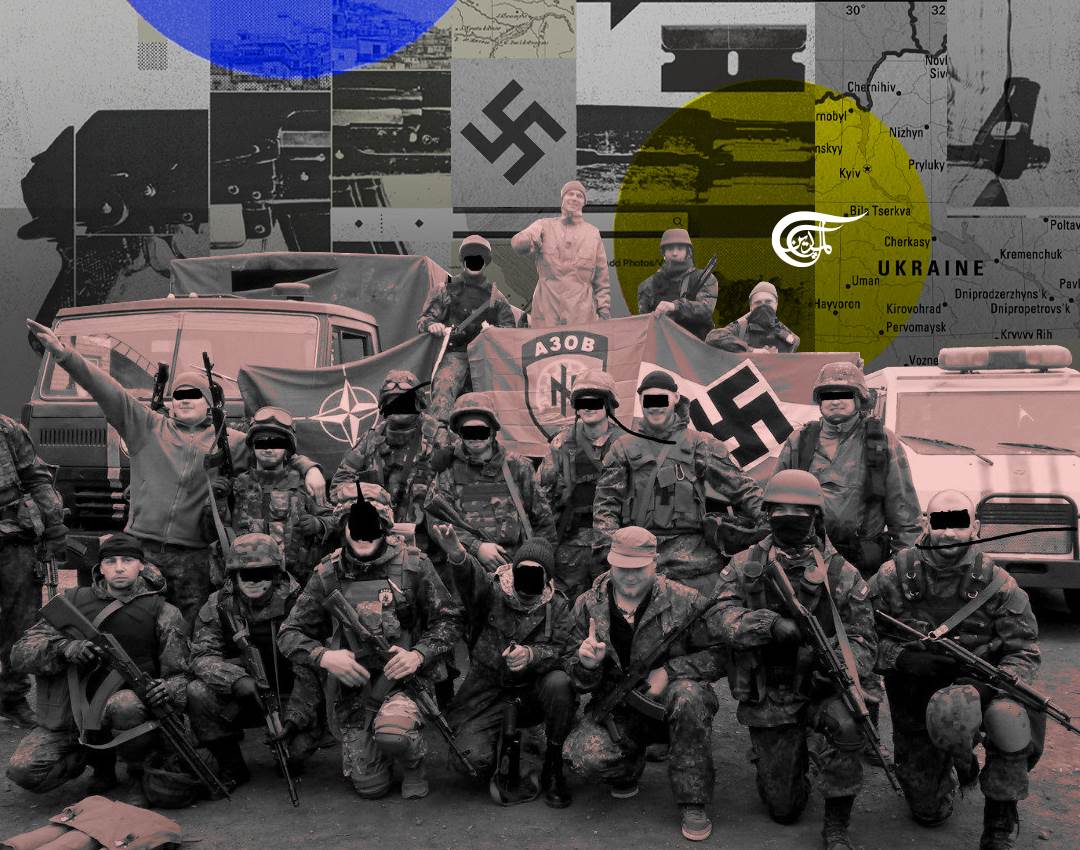Why the West may want Russia to invade Ukraine
While such hostile threats being directed at Moscow by US officials is standard practice, there may be more to them in this case.
-

Azov battalion, the neo-Nazis of Ukraine
With the repeated American warnings of an imminent Russian invasion of Ukraine despite the Russian assurances and the Ukrainian president Volodymyr Zelenskyy’s statements implying the West was creating unnecessary panic, the question of the United States actually wanting Russia to invade and occupy Ukraine is warranted. Past events in places like Afghanistan may be seen by Western policy-makers as a scenario that could be replicated in Ukraine. However just as Afghanistan ended up in a severe blowback for the West the same applies to Ukraine albeit on a much more dangerous level.
The Russian occupation scenario
The commentary by some of the most prominent establishment-connected journalists in Washington hints not only at a wish for a Russian invasion but of occupation, under the assumption that such a scenario will bleed Russia out just as the occupation of Afghanistan did to the Soviet Union.
In an article on February 14 by the Washington Post’s David Ignatius titled “Putin’s impending march of folly in Ukraine” the writer quotes American officials who reveal operational details of an imminent large-scale Russian offensive into Ukraine. Ignatius -- who is known for his close contacts with the CIA – reaches the conclusion that Russian forces will proceed to occupy Ukraine following the supposed invasion. But what is most revealing is the argument made by the author that Russia’s troubles will actually start after the” occupation” of Ukraine, and the comparison he draws in this regard between a potential Russian offensive into Ukraine and the US experiences in Iraq and Afghanistan:
“If just 10 percent of Ukraine’s 40 million people decided to actively resist occupation, they would mount a powerful insurgency. Small bands of motivated fighters subverted America’s overwhelming military power in Iraq and Afghanistan” Ignatius writes.
According to Ignatius therefore the current crisis in Ukraine may be an opportunity to get Russia into a quagmire akin to those that America has faced and that has contributed significantly to its global decline. In a similar vein, unnamed American officials have been quoted as saying that Russian troops will return in body bags if Moscow were to go ahead with an invasion of Ukraine.
While such hostile threats being directed at Moscow by American officials is standard practice, there may be more to them in this case, especially given that similar sentiments have been expressed at an official level. US joint chief of staff Mark Milley reportedly issued a warning to his Russian counterpart Valery Garasimov that Russian forces would be met in Ukraine with a “bloody insurgency” similar to what the Soviet forces faced in Afghanistan.
That Washington is striving to get Russia bogged down in a quagmire makes sense in that it comes as the US shifts gears from a focus on "fighting terrorism" to a focus on “great power competition”. It is possible that Washington calculates that just as the Soviet occupation of Afghanistan was a major factor in the ultimate demise of the Soviet Union during the previous era of “great power competition” so too will a Russian occupation of Ukraine blunt the rise of Russia and more importantly the emerging alliance between Moscow and Beijing.
Despite the many differences between Ukraine and Afghanistan there also exist similarities, most notably the presence of combat fighters with an ideological zeal that can be used against a (supposed) Russian “occupying” force.
The neo-Nazis of Ukraine
While the so-called “Mujahideen” in Afghanistan represented an “Islamic” force with which to fight Soviet troops, there exists in Ukraine a heavy presence of neo-Nazis who espouse an ideology that is no less extreme than that of the “Mujahideen”.
The main neo-Nazi force is a group under the name the “Azov Battalion”. This group emerged with the onset of the fighting in the eastern Ukranian Donbass region and was later incorporated into the Ukranian National Guard. It has been described as one of the most effective fighting forces against ethnic Russian inhabitants of Donbass.
The Azov battalion takes its name from the battle of the sea of Azov in World War 2, when Nazi Germany and its allies defeated the Soviet forces and proceeded to take control of both Donbass and Crimea.
Although some of the members of the group deny the neo-Nazi association, there nevertheless exists a narrative that is eerily similar to that which was propagated by Adolf Hitler. During an interview with the Guardian, a member of Azov who identified himself as “Dimitry” described Russian President Vladimir Putin as “not even a Russian” but rather “a Jew”. This characterization is almost identical to Hitler’s description of Russia in his autobiography Mein Kampf where he states that “the international Jew” dominates Russia.
That Washington may be planning to use the neo-Nazis in Ukraine against a Russian “invasion” and “occupation” is further supported by the stances advocated by the ‘Atlantic Council’, a Washington think tank that has been at the forefront of the lobbying efforts to push the Biden administration into taking a more confrontational stance with Russia over the issue of Ukraine and specifically the Donbass and Crimea regions.
As the renowned American scholar David Hendrickson has noted, the ‘Atlantic Council’ has succeeded in steering the Biden administration's policy visa-vi Russia and Ukraine towards its anti-Moscow agenda.
Interestingly scholars affiliated with this think tank have spoken out against the designation of the Azov Battalion as a terrorist organization arguing that the movement had sought to de-politicize itself. Such an approach would allow for the provision of various types of weapons to the Ukraine military and security apparatus without facing the constraints that come with the terrorism designation and also for the provision of weapons to the most ideologically motivated anti-Russian forces in Ukraine.
The blowback scenario of supporting the neo-Nazis of Ukraine
While supporting the neo-Nazis may seem like an attractive option in terms of getting Russia dragged into a quagmire similar to that which it faced in Afghanistan, this option also carries with it the danger of a severe blowback against the West. Just as Afghanistan became a base for extremism following the withdrawal of Soviet Troops which culminated in the September 11 attacks, Ukraine is likely to become a base for right-wing extremism if a similar scenario were to play out in that country. According to the Soufan Center, a large number of foreign fighters with right-wing sympathies have already traveled to Ukraine to fight alongside the Azov Battalion against the ethnic Russian population in Donbass. It is even believed that the perpetrator of the Christchurch massacre in New Zealand Brenton Tarrant may have received training in Ukraine during a trip he paid to that country, which would make him the first ‘foreign fighter’ from the white supremacist movement to commit such an act of terror. Amongst those that have also traveled to Ukraine to link up with the Azov Battalion are members of the US-based neo-Nazi ‘Atomwaffen Division’. American extremists have reportedly traveled to Ukraine with the sole purpose of gaining battlefield experience.
Most importantly however Azov has a broader agenda that does not stop at fighting Russia. Here as well one can see a similarity with so-called “Islamist” groups like Al-Qaeda and ISIS (both of whom had broader agendas that extended beyond Afghanistan and Iraq and Syria respectively). Officials from Azov have bluntly stated that the movement sought to create a far-right coalition spanning the entire Western world with the end goal being to take power over the entire European continent.
The potential blowback scenario however for supporting the neo-Nazis against a Russian “occupation” is likely to have repercussions far more dangerous for the West compared to what it faced in the case of Afghanistan or Syria for that matter. While groups like Al-Qaeda and ISIS described the West in terms like ‘the far enemy’ --- as opposed to groups like the Shiite being labeled as the ‘near enemy – the spread of the right-wing threat represented by ideologies like neo-Nazism and white supremacism is a threat ‘from within’, particularly given the rise of right-wing sentiments in the Western world. As a result, Western nations are unlikely to be adequately equipped to deal with the repercussions of a neo-Nazi state emerging in Ukraine. Russia for its part does not suffer from such a right-wing trend in its society and would therefore be relatively immune to the repercussions. This would mean that the West would pay the highest price if it were to pursue an Afghan-like policy in Ukraine even if such a policy were to succeed in defeating a Russian “occupation” force in the short run.

 Ali Rizk
Ali Rizk
 8 Min Read
8 Min Read











